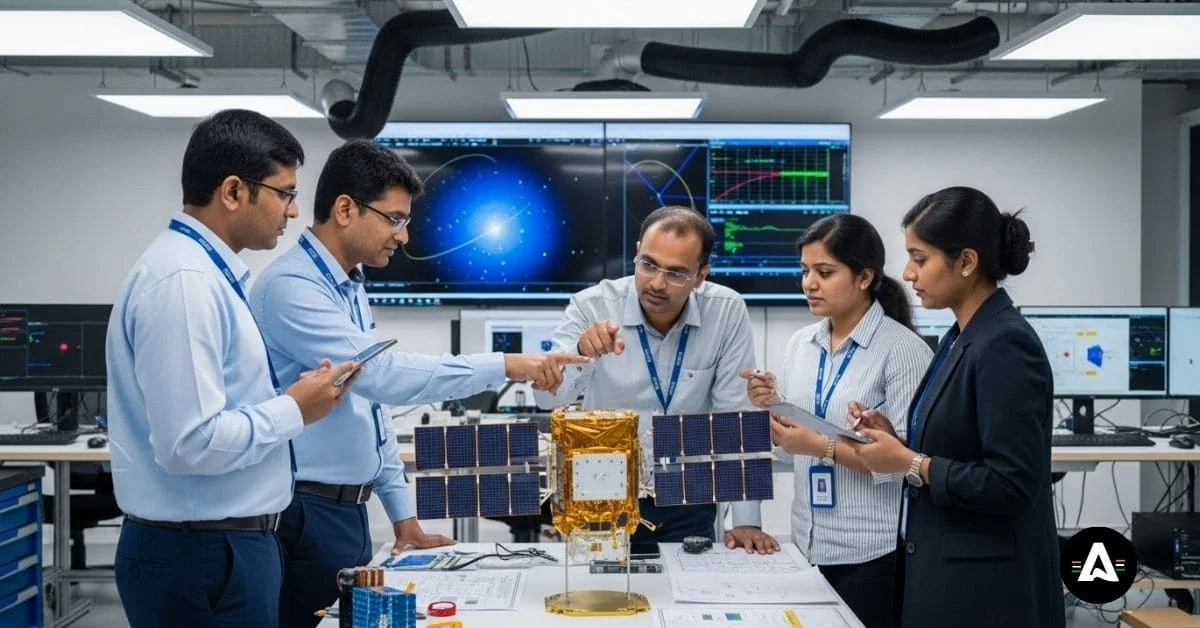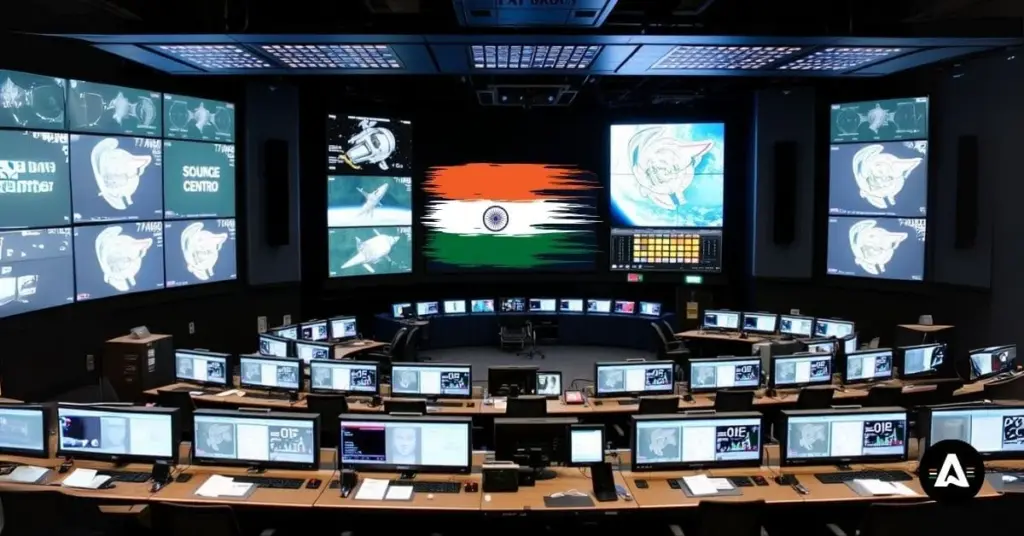The Rise of Space Tech Companies in India: A Deep Dive

Number of Space Tech Companies in India is growing fast. The private sector is playing a bigger part, and there is strong government support.
New companies like Skyroot Aerospace, Pixxel, and Agnikul Cosmos are bringing fresh ideas to satellite launch vehicle technology.
A lot of work in agriculture, finance, and defense uses satellite imagery and earth observation data.
The Indian Space Research Organisation and Indian National Space Promotion are working together. This helps the private sector get more involved.
India is becoming stronger in low Earth orbit operations and taking on more difficult space missions.
With more money from venture capitalists going into the space economy, the private sector in space research will see big growth.
Detailed Industry Overview (Market Size, Growth, Trends)
The Indian space tech industry is currently experiencing a remarkable transformation, driven by an increase in private sector participation and a favorable policy environment. As of 2023, the market size of India’s space industry is estimated to cross $8 billion, reflecting a robust growth trajectory fueled by advancements in satellite technology, launch capabilities, and the rise of innovative startups. The expectation is that this sector will grow at a CAGR of over 20% in the coming years, spurred on by the increasing demand for satellite-based services across various sectors such as agriculture, telecommunications, and environmental monitoring. Furthermore, the trend towards collaborative projects between governmental organizations like ISRO and private companies is set to expedite technological innovation, making India a competitive player on the global stage. Investors are also taking keen interest, particularly in startups focused on niche segments like satellite propulsion systems and earth observation data analytics, which show significant potential for contributing to both economic growth and societal advancements. This emerging landscape illustrates the vibrancy and dynamism of India’s space tech sector, making it an exciting domain to watch in the decade ahead.Introduction
The space sector in India is growing fast. In the past, the Indian Space Research Organisation was the main name in space research. But now, private companies are getting into space tech. This is helping to move the field to new heights.
The government is also taking new steps and making new rules. These private firms and the government are working together to help the private space sector in India grow. They are bringing out new satellite technology and also making rockets that cost less. People from all over the world are starting to see this hard work and progress in space tech.
The way things are right now shows that India is going to be one of the top names in space tech. This is because the country is making big moves to get ahead in this area. A lot of people around the world can see that India is doing well in space tech.
Exploring the Rise of Space Tech Companies in India
India’s space industry is getting bigger and going up fast. The private sector is now taking a lead and changing how things are done. There are many new ideas coming out because there are more open rules and the government is making fewer restrictions. A lot of startups are bringing in new space tech to help the industry grow. There are now over 400 companies working in this field. These companies work on satellite manufacturing, earth observation, and use data analytics for better results.

Historical Evolution of India’s Space Sector
The historical evolution of India’s space sector is a fascinating journey that dates back to the early 1960s when the vision for space exploration began to take shape. The Indian National Committee for Space Research (INCOSPAR) was established in 1962 under the guidance of Dr. Vikram Sarabhai, who recognized the potential of space technology for national development. This laid the groundwork for the creation of the Indian Space Research Organisation (ISRO) in 1969. The initial focus was on developing indigenous satellite technology and launching capacities, leading to the successful launch of the Aryabhata satellite in 1975, which marked India’s entry into the global space arena. Over the decades, ISRO made significant strides with the development of launch vehicles like the PSLV and GSLV, enabling a range of applications from telecommunications to earth observation. The 2000s saw the advent of various space missions, such as the Chandrayaan-1 and Mars Orbiter Mission (Mangalyaan), showcasing India’s capabilities on the international stage. Notably, the liberalization of the Indian economy and supportive government policies in recent years have paved the way for private sector involvement, further transforming the landscape of space exploration in India. Today, India is viewed as a rising power in space technology, with a robust ecosystem comprising both public and private entities driving innovation and growth.
These companies are thinking about what people in India want when it comes to space technology. They are also looking for chances to work in other countries. With more private investment and a good plan for the future, it looks like the space tech community in India will grow fast. There is a lot of space for new ideas and things to happen in India’s space industry.
1. Skyroot Aerospace: Pioneering Affordable Launch Solutions
Skyroot Aerospace is the first private Indian company to launch a rocket. This has made it a big name in the spacetech area in India. The main launch vehicle from them is Vikram-S. It is good because it is both low-cost and works well. This way, Skyroot Aerospace has set new records in Indian aerospace. They show what the use of new ideas and keeping costs low can do.
Skyroot is about more than just low prices. The team puts in a lot of work to make sure their Indian launch vehicles are ready for the global market. They use a modular and lightweight design in these launch vehicles. This design makes it much easier to put satellites into space. Because of this, more people and businesses from all over the world can get access to space and take part in the global market.
Private firms in India, like Skyroot, are proving they can do well. They get help from government support and work hard to grow their business. These companies also try to get into the global market and compete outside India. Their bold ideas are making changes to how rocket launches work for everyone.
2. Pixxel: Advancing Earth Observation with Satellites
Pixxel has become a strong name in the earth observation and space tech field. The company uses hyperspectral imaging to get clear pictures from space. Their small satellite payloads help people in many ways. These tools are good for areas that need satellite data, like agriculture, environmental checks, and disaster management. Pixxel’s work shows how earth observation and satellite data can make a real difference for us all.
Pixxel plans to put 24 satellites into space. With this, they want to lead the world in hyperspectral imaging. Their system gives clear and detailed earth observation. It is as good as what the best companies in the world offer. Because of support like iDEX grants, Pixxel can find new ways to help in many use cases.
This plan shows how Pixxel is changing the way India uses satellite data. The company is helping people in different fields make better choices. Pixxel is doing this by making strong and easy-to-use systems for everyone.
3. Agnikul Cosmos: Revolutionizing Rocket Manufacturing
Agnikul Cosmos is making big changes in India’s space industry with its new rocket engine technology. The company has built the first rocket engine in the world that was made fully with 3D printing. This is a strong sign of new ideas and fast action in building rocket engines.
In 2024, Agnikul sent the Agnibaan SOrTeD rocket up from Dhanush. This place is the first private launchpad in India. This event showed that they can take on tough space missions. Their rocket engine uses both gas and liquid fuels. It is a big step forward in propulsion systems.
Agnikul Cosmos shows what private players can do in India’s space industry. They prove that companies here can match and even beat others around the world. They move forward in satellite launch vehicles and space exploration. This is a good example for the space industry and for others who want to get into space exploration.
4. Dhruva Space: Innovating Satellite Platforms
Dhruva Space is a spacetech startup in Hyderabad. It was started by Sanjay Nekkanti. The company is good at satellite manufacturing and satellite launches. Dhruva Space gives a full range of services. They put all the needed things like satellites, launch services, and earth stations together in one simple plan.
In 2021, Dhruva Space reached a big goal. It became the first company in India from the private sector to get an order for space-ready solar arrays. Dhruva Space knows a lot about satellite interface work. This lets the company help private groups work better with ISRO.
Dhruva Space, led by Sanjay Nekkanti, is showing how putting many services together is changing the way people do satellite manufacturing. These new ways are helping operators and manufacturers work closer with each other.
5. Bellatrix Aerospace: Developing Propulsion Systems
Bellatrix Aerospace is making people see space technology in a new way. The company is one of the top names in propulsion systems for satellites. Bellatrix Aerospace gets help from government support and private investment. They work to bring down costs and still give high performance.
The team at Bellatrix Aerospace works with the Department of Space. They use advanced thruster technology for space exploration. This helps with sending missions into space. Their work also makes satellites run better and last longer. The company is now starting to make their products in other countries like the United States. Because of this, they can get into more global markets than before.
Bellatrix Aerospace wants to lead when it comes to satellite propulsion. This company is a good example of how private companies can bring something new to the spacetech sector in India. Many people hope that Bellatrix Aerospace will help move India’s space technology ahead.
6. SatSure: Leveraging Data Analytics for Agriculture and Finance
SatSure uses satellite imagery and earth observation data in new ways. They get information from space and use it to help people in farming and finance. Their technology helps with smart farming and planning for disasters. It also lets people make good finance decisions using earth observation data.
SatSure is known for using satellite data in many ways. This means it can help more than just the aerospace field. The company gives people tools to predict droughts and figure out how much crops will grow. They help India be strong in earth observation. They also work to help more people use satellite data.
SatSure shows what can happen with space research. They use new technology to help regular industries. This closes the gap between high-tech ideas and real-world needs.
7. Astrogate Labs: Enabling High-Speed Space Communication
Astrogate Labs, run by Arpan Sahoo, works on making space data and satellite communication faster. The team tries to make things better for ground and space channels. People now want good, fast, and reliable data, so their work at Astrogate Labs is important.
The company works to build space infrastructure. This shows the team’s strong drive to make communication in outer space better and simple for everyone to use, even if there are some problems on space missions. By making systems that help with easy data transmission, Astrogate Labs is helping satellite communication get better all over the world.
Astrogate Labs is a good example of how startups help move space technology forward. The company helps India have a bigger part in the spacetech sector around the world.
8. Digantara: Focusing on Space Debris Tracking
Digantara works to solve the big problem of space debris. The company is making new ways to track things in earth’s orbit. It plans to use a strong group of satellites. These will watch what happens in earth’s orbit. This helps make outer space safer for people and machines. It will lower the risks faced when working in outer space.
Digantara helps people know more about the trash out in orbit. This helps private sector companies be safer when it comes to space travel and looking into space. By doing this, Digantara makes sure that India is taking early steps to fix any problems in the fast-growing spacetech sector.
Digantara shows how startups in the space industry can find their own special place to work in. By doing this, they help make India known in the world.
Other Emerging or Notable Space Tech Players Not Widely Known
In addition to the well-known startups like Skyroot Aerospace and Pixxel, several other emerging space tech players are quietly making significant contributions to India’s space landscape. One such company is Kawa Space, which specializes in satellite-based solutions for remote sensing and analytics. Kawa Space aims to provide accurate agricultural forecasts, environmental monitoring, and disaster management data by leveraging its satellite imagery capabilities. Another noteworthy player is BlackSky, focusing on real-time earth observation with its innovative satellite constellation. BlackSky’s mission is to provide timely information that can aid businesses and governments in making informed decisions. Additionally, Stellar Industries is carving out a niche by developing advanced propulsion systems and orbital launch vehicles that promise to optimize costs and fuel efficiency. By pushing the boundaries of current capabilities, these lesser-known firms are not only diversifying India’s space technology ecosystem but also enhancing its competitive edge in the international arena. This growing diversity exemplifies how the space tech sector in India is not just a story of a few shining stars but a constellation of companies each contributing to a vibrant future.
Key Drivers Behind India’s Booming Space Tech Sector
India’s space tech sector is growing fast. The indian government has made some new moves that help private firms in this area. These new policies make it easier for companies to start and grow. A lot of these firms get help with money, too. This gives many private firms the support to do more, both in India and outside the country.

Good teamwork between top companies, ISRO, and the department of space keeps the space tech field moving forward. The people working together on this bring new ideas in satellite launches, earth observation, and how we talk to each other through space. This helps make the future better for everyone in this work.
Government Policy Reforms and ISRO Support
Table: Key Government Space Policy Reforms
Policy Reform | Impact |
|---|---|
Spacecom Policy | This helps private companies get involved. |
2023 Indian Space Policy | This pushes for new ideas and more competition. |
Union Cabinet Approval | This allows FDI for satellite and space systems. |
IN-SPACe Establishment | This brings private research groups into the space field. |
Policies like the new FDI limits and the Space Activities Bill help bring in more private investment in satellite manufacturing and operations. ISRO is also busy, working with several new private space companies. This helps make early space launches better, which helps many kinds of missions. When IN-SPACe comes in with new ideas, the rules for joining are now clearer. This means more people and groups can join in. They can also work in a better and faster way.
Role and Achievements of ISRO (Deeper Coverage)
The Indian Space Research Organisation (ISRO) has long been the cornerstone of India’s space endeavours, playing a pivotal role in shaping the nation’s capabilities in this critical field. Established in 1969, ISRO’s achievements include a series of successful satellite launches and missions that have showcased India’s technological prowess on the global stage. Notable milestones include the Chandrayaan-1 mission, which made India the fourth nation to reach the moon, and the Mars Orbiter Mission (Mangalyaan), which made India the first country to successfully navigate a spacecraft to Mars on its maiden attempt. ISRO’s contributions extend beyond mere exploration; it has facilitated significant advancements in areas like telecommunications, weather forecasting, and disaster management through its satellite systems. The organisation is also instrumental in fostering an ecosystem that encourages private participation, particularly through initiatives like IN-SPACe, aimed at creating a supportive regulatory environment for emerging space tech companies. This dual focus on innovation and collaboration continues to propel India’s ambitions in space, ensuring that ISRO remains at the forefront of global space exploration.
Growing Private Investment and Startup Ecosystem
Private investment is changing how the space industry works in India. There are now venture capital funds, and the government is giving $119 million to help. This is good for startups as it gives them support. Programs like Startup India and iDEX also help them a lot. These things are making it better for people to get into India’s space industry.
The Indian Angel Network and several other top investors have a big role in helping young companies grow here. These programs give help to more than 400 companies. India’s space industry plan also supports growth and helps the space industry from here become strong in global markets.
Investment and Valuation Strategies for Indian Space Tech Startups
As the Indian space tech ecosystem rapidly evolves, investment and valuation strategies for startups in this sector are becoming increasingly vital. Investors are not only keen to understand the technological innovations being developed but also to assess the scalability and market potential of these solutions. Key strategies include evaluating the startup’s intellectual property, partnerships with government agencies like ISRO, and its alignment with national priorities around space exploration and satellite communications. Additionally, understanding revenue models—whether through service contracts, satellite launches, or data analytics—can provide investors with a clearer picture of a startup’s long-term viability. The growing interest from venture capital firms and government initiatives aimed at empowering space tech companies further enhances the potential for robust valuations in this promising space. Consequently, startups must present a convincing business case that highlights both their technological capabilities and market strategy, ensuring they remain attractive in a competitive investment landscape.
Space Tech Startup Incubators and Innovation Hubs in India
In recent years, India has witnessed a burgeoning ecosystem of space tech startup incubators and innovation hubs, which play a pivotal role in nurturing young companies working on cutting-edge space technologies. These incubators not only provide essential resources and funding but also foster an environment that encourages collaboration and knowledge exchange among budding entrepreneurs. Notable players in this space include the Indian Space Research Organisation (ISRO) and various private entities that have launched initiatives aimed at supporting startups through mentorship, infrastructure, and access to advanced technologies. By facilitating partnerships with established aerospace companies and research institutions, these hubs aim to propel innovative projects from conception to successful commercialization. As the global space market expands, India’s commitment to nurturing its space tech ecosystem is set to yield significant advancements and initiatives that could redefine the country’s role in the international space arena.
In-Depth Analysis of IN-SPACe and Its Impact on Private Sector Growth
IN-SPACe, or the Indian National Space Promotion and Authorization Center, plays a crucial role in fostering an environment conducive to private sector participation in space activities. Established to promote, authorize, and facilitate space-based innovations in the country, IN-SPACe serves as a bridge between the private players and the government. With the shifting landscape of space exploration, the emphasis on collaboration has never been more critical. By providing a structured framework for private entities, IN-SPACe not only empowers space tech companies in India to take initiatives but also enhances their ability to develop cutting-edge technologies and services. This collaborative approach is anticipated to catalyze significant investments, paving the way for more robust infrastructure and capabilities within the Indian space sector. Consequently, the impact of IN-SPACe on private sector growth is profound, setting the stage for ambitious projects that align with global standards while also catering to domestic needs.
Rising Demand for Satellite-Based Services
Satellite-based services help the space economy in many ways. They play a big part in things like communication and earth observation. Now, businesses in places like farming and finance use satellite launches to get many types of data.
India’s role in the world helps it team up with others on new use cases. Every day, people in India need satellite imagery more and more. This helps with handling all kinds of geographical data in a good way. The rise in need for satellite tech shows just how important it is for India’s space economy to grow.
Indian Space Tech’s Contribution to Non-Traditional Sectors (Education, Health, Disaster Management)
Space tech companies in India have begun to significantly impact non-traditional sectors such as education, health, and disaster management. By leveraging satellite technology and data analytics, these companies are developing innovative solutions that address pressing challenges in these areas. For instance, in education, satellite-based e-learning platforms enable remote learning opportunities for students in rural and underserved regions, bridging the digital divide. In the health sector, satellite imagery and communication can enhance telemedicine services, allowing specialists to provide remote consultations and monitor patients effectively, regardless of geographical barriers. Moreover, in disaster management, space tech plays a crucial role in monitoring environmental changes and predicting natural disasters, thus enabling timely interventions and reducing the risks associated with such events. The cross-pollination of space technology with these sectors not only elevates their operational efficiency but also forms a robust foundation for a more resilient society.
Challenges Faced by Indian Space Tech Startups
Space tech companies in India have money problems. There are not enough government grants for them. It is also hard to get early money to start. The rules in the country make it hard for new companies to grow. New spacetech startups have trouble getting to use test centers. The tax rules are also hard to deal with.
There are other problems too. Indian spacetech startups have a hard time setting up the things they need. There are rules on what they can sell outside the country. This can make it hard for them to get the new tools or tech they need from other places in the world.
If the government steps in and gives real help, these problems can be solved. Good rules and fair support from the government can make sure that spacetech startups and rule makers stay on the same page. This way, the two sides can work well together and get good results.
Funding and Infrastructure Limitations
Funding gaps can make it hard for startups to build strong space technologies. There are not many government grants out there, so private firms need to fight over smaller amounts of money. New programs that offer big investments help a lot because they make things a bit easier for people in the industry.
There are problems with the infrastructure right now. The test beds are not fully done yet. But support from things like subsidy programs and tax breaks helps keep these problems small. This change makes it easier for private firms to stay in the game against other large players from around the globe.
Regulatory and Compliance Hurdles
Unclear rules can slow down progress for many new startups that want to be in tough industries. When there is a clear and easy-to-follow policy, things go more smoothly. This also makes export limits easy to know and follow. Programs that work on these problems help new companies get ready to join the market.
Vendor buying policies help new startups work well with people in other departments. This helps make sure everyone has space to do their work in the area.
Conclusion
The country is seeing more space tech companies start up. This is a big step for new ideas and business. These startups use space technology and also get help from the knowledge that ISRO has. They push what we know about space exploration. The work these companies do also helps with real issues in different fields. Now, more changes are coming up and it looks like the space tech area in India will keep growing. If you want to stay in the loop or be a part of this field, you can read about new space tech companies and see what trends are happening. To support space tech, check out our SpaceTech merchandise and join us on this trip!
Frequently Asked Questions
Aditya L1 is special because it is always watching the sun. It has tools that help it see the corona and the solar wind very closely. Aditya is at the L1 point and this place lets it get data all the time, without any break. With Aditya, we can learn more about the sun, its corona, and the solar wind in ways that we could not do before.




